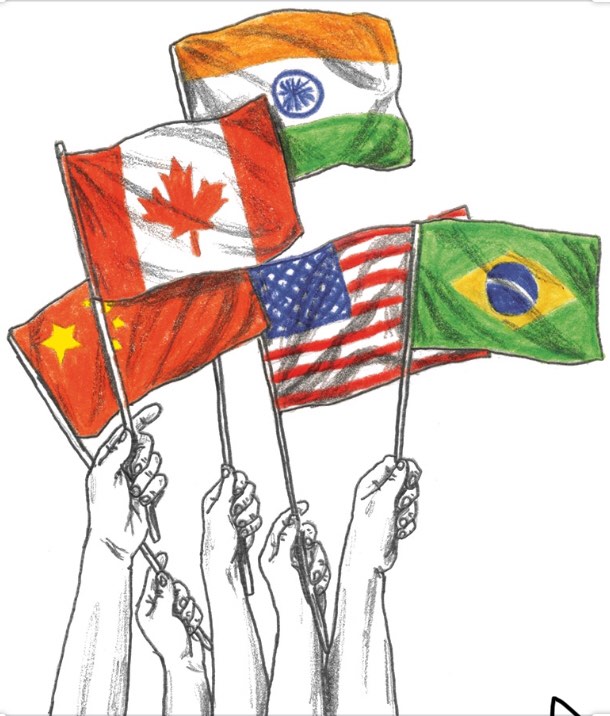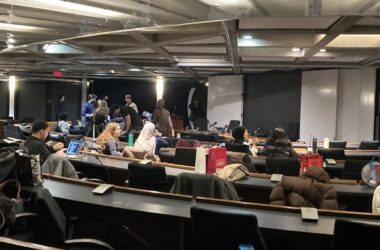Everyone seems to have labels for each other, often used as a means to define every characteristic of an individual. One universal label, “immigrant”, is used to define someone who comes to live permanently in a foreign country. This categorization can follow a family years after their ancestors migrated and is often broken down into three categories: First-, second-, and third-generation immigrants. The first generation was born outside Canada and moved here as adults; the second is the Canadian-born children of the first generation; and the third is their grandchildren. However, these terms often fail to include the experiences of those who were not old enough when they moved here to be classified as first-generation immigrants nor young enough to be considered part of the second generation. An instance that shows this unique circumstance for individuals in the middle comes when they are asked the question, “Where are you from?” For those in the first-generation and the second-generation, this often refers to the country they were born in; while for those in the middle, like me, the answer is more complicated.
To shed light on the experiences of those who migrate before or during their early teenage years, American sociologist Ruben Rumbaut coined the term ‘1.5 generation’ in the 1960s. He developed this distinction to refer to individuals like himself, who he saw as “stuck in-between” cultures as they were not quite first or second generation migrants. 1.5 generation immigrants bring with them characteristics of their country of origin while still assimilating to their new home more than their parents. These individuals have a unique perspective of migration—one that is often not recognized.
The 1.5 generation’s early start to dramatic changes can have its benefits. For instance, facing various school systems can be a daunting experience. However, the stress of dealing with such a huge shift early on in life can prove, in the long run, to serve as an advantage for 1.5 generation children. Across the globe, many students struggle with the transition from living at home with family to university life on their own, but the 1.5 generation who have experienced drastic changes earlier in life may find themselves having an easier time adapting than their peers. Rachel Habrih, U3 Arts, described how emigrating from France to Canada as a child helped her transition to life away from home and how it further enriched her identity as a immigrant.
“Going to university was a transition that I was very much used to,” Habrih said. “I never related to the rhetoric that university was uniquely difficult or daunting [….] The only thing that I find very different from all the other transitions I’ve experienced is that, in university, I know that there is such variety in experiences. There is always someone who can relate to you in some way.”
Although university provides a space in which students can find peers who share their experiences, this outlet does not always exist in one’s early years as an immigrant. In the first few years post-migration, these individuals may have trouble fitting into a new environment while still trying to maintain the traces of their birth country held by their parents. Dealing with this duality has its challenges, but witnessing your parent’s journey as migrants and adapting to a new culture as a family can be a rewarding experience. In understanding each other’s struggles, the process can bring a family closer together. For Juliana Schneider, U3 Arts, her background as a migrant has helped her better understand that her parents made multiple sacrifices when they decided to move to a foreign land.
“For my parents, the transition was much harder because they had spent their whole lives in one part of the world,” Schneider said. “There are so many intricate details you have to learn when it comes to transitioning […] and integrating into a new culture, I can’t imagine how challenging this must have been for them.”
Although adaptation can be easier as a child, being in the 1.5 generation does not come without its challenges. For immigrants like Habrih, integrating into a new culture, making new friends, and learning a new language can lead to feelings of separation and marginalization that can impact an individual’s overall cultural identity.
“I think being a 1.5 generation kid, for me, means balancing multiple cultures, not just two, and oftentimes having these cultures conflict with each other,” Habrih said.
This deeper identity struggle can further present itself within the most tumultuous shifts in life, such as the transition to university where one must find a new place of belonging. They often have to determine how they relate to two groups; one being their diaspora who may be more integrated into their heritage and the other being Westernized students who may hold conflicting values and traditions. The process of overcoming this barrier is the task of the individual as they experience these moments and find a sense of belonging between their two homes. As time passes, individuals learn to balance life “in-between” by either embracing both aspects of their two homes or leaving one behind entirely. Lynn Lee, U2 Arts, learned to love her experiences as a migrant and credits it with helping to shape her overall self confidence.
“I think being a 1.5 gen [person] has certainly contributed a lot to my identity,” Lee said. “As a kid, I hated the fact that I would say I was Korean in Canada, and then when I went to visit relatives in Korea, I was labelled the Canadian. Now, I’m a lot more comfortable with the fact that I’m both, and although a lot of other things make up someone’s identity, to me these dual experiences are very important.”
Despite the extra challenges with the often constant tug-of-war between the two cultures, the 1.5 generation has the unique benefit of seeing the dynamics of both first and second generation cultural norms firsthand. This experience allows them to navigate cultural fluidity through learning to embrace both their old and new heritage. Schneider observed that these differing perspectives from her 1.5 generation status helped when meeting new people.
“It’s amazing to be able to connect with other people not only through different languages, but you also know and understand the mentalities of different cultures,” Schneider said.
For many, the adaptation of the term “1.5 generation” has helped them find their identity as an immigrant. Learning this term has helped me comprehend my place as a migrant in this unspoken middle ground. The experience of my sister and me seemed insignificant in comparison to our parents, and it seemed unfair to place ourselves in the same categories as them. Having a distinction of my own helps to put my story growing up in a foreign land into perspective and understand that I am not alone with my journey as a young immigrant. The 1.5 generation is often overlooked, but in reality, we have a lot to offer as our stories demonstrate perseverance, adaptability, and an ability to overcome challenges while embracing new experiences. So, when I am asked, “Where are you from?”; I know it means where my home is. As a 1.5 generation migrant, home is not necessarily one place and coming upon this realization about this core aspect of myself is liberating.








Great Insight…
Thanks a lot for the article, I myself am a 1.5 generation and I came across this term a few years ago. Do you happen to have any suggestions on books to read about this topic?